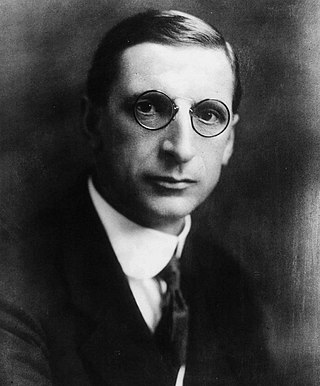Related Research Articles

The Ulster Unionist Party (UUP) is a unionist political party in Northern Ireland. The party was founded as the Ulster Unionist Council in 1905, emerging from the Irish Unionist Alliance in Ulster. Under Edward Carson, it led unionist opposition to the Irish Home Rule movement. Following the partition of Ireland, it was the governing party of Northern Ireland between 1921 and 1972. It was supported by most unionist voters throughout the conflict known as the Troubles, during which time it was often referred to as the Official Unionist Party (OUP).

The 1918 Irish general election was the part of the 1918 United Kingdom general election which took place in Ireland. It is a key moment in modern Irish history because it saw the overwhelming defeat of the moderate nationalist Irish Parliamentary Party (IPP), which had dominated the Irish political landscape since the 1880s, and a landslide victory for the radical Sinn Féin party. Sinn Féin had never previously stood in a general election, but had won six seats in by-elections in 1917–18. The party had vowed in its manifesto to establish an independent Irish Republic. In Ulster, however, the Unionist Party was the most successful party.
The Progressive Unionist Party (PUP) is a minor unionist political party in Northern Ireland. It was formed from the Independent Unionist Group operating in the Shankill area of Belfast, becoming the PUP in 1979. Linked to the Ulster Volunteer Force (UVF) and Red Hand Commando (RHC), for a time it described itself as "the only left of centre unionist party" in Northern Ireland, with its main support base in the loyalist working class communities of Belfast.

The 1892 United Kingdom general election was held from 4 to 26 July 1892. It saw the Conservatives, led by Lord Salisbury again win the greatest number of seats, but no longer a majority as William Ewart Gladstone's Liberals won 80 more seats than in the 1886 general election. The Liberal Unionists who had previously supported the Conservative government saw their vote and seat numbers go down.

North Down Borough Council was a Local Council in County Down in Northern Ireland. It merged with Ards Borough Council in May 2015 under local government reorganisation in Northern Ireland to become North Down and Ards District Council.
Sir James Alexander Kilfedder, usually known as Sir Jim Kilfedder, was a Northern Irish unionist politician.

Strangford is a parliamentary constituency in the United Kingdom House of Commons. The current MP is Jim Shannon of the DUP.

North Down is a parliamentary constituency in the United Kingdom House of Commons. The current MP is Stephen Farry of the Alliance Party. Farry was elected to the position in the 2019 general election, replacing the incumbent Sylvia Hermon. Hermon had held the position since being elected to it in the 2001 general election, but chose not to contest in 2019.

Walter Hume Long, 1st Viscount Long,, was a British Unionist politician. In a political career spanning over 40 years, he held office as President of the Board of Agriculture, President of the Local Government Board, Chief Secretary for Ireland, Secretary of State for the Colonies and First Lord of the Admiralty. He is also remembered for his links with Irish Unionism, and served as Leader of the Irish Unionist Party in the House of Commons from 1906 to 1910.

The Irish Unionist Alliance (IUA), also known as the Irish Unionist Party, Irish Unionists or simply the Unionists, was a unionist political party founded in Ireland in 1891 from a merger of the Irish Conservative Party and the Irish Loyal and Patriotic Union (ILPU) to oppose plans for home rule for Ireland within the United Kingdom of Great Britain and Ireland. The party was led for much of its existence by Colonel Edward James Saunderson and later by St John Brodrick, 1st Earl of Midleton. In total, eighty-six members of the House of Lords affiliated themselves with the Irish Unionist Alliance, although its broader membership among Irish voters outside Ulster was relatively small.
Sir Denis Stanislaus Henry, 1st Baronet,, was an Irish lawyer and politician who became the first Lord Chief Justice of Northern Ireland.

The 2007 Northern Ireland Assembly election was held on Wednesday, 7 March 2007. It was the third election to take place since the devolved assembly was established in 1998. The election saw endorsement of the St Andrews Agreement and the two largest parties, the Democratic Unionist Party (DUP) and Sinn Féin, along with the Alliance Party, increase their support, with falls in support for the Ulster Unionist Party (UUP) and the Social Democratic and Labour Party (SDLP).
The Northern Ireland Conservatives is a section of the United Kingdom's Conservative Party that operates in Northern Ireland. The party won 0.03% of the vote in the 2022 Northern Ireland Assembly election and 0.7% of the vote in the 2019 United Kingdom General election in Northern Ireland.
West Down was a constituency of the Parliament of Northern Ireland.

The 2011 Northern Ireland Assembly election took place on Thursday, 5 May, following the dissolution of the Northern Ireland Assembly at midnight on 24 March 2011. It was the fourth election to take place since the devolved assembly was established in 1998.
The 1905 Buteshire by-election was a by-election held on 3 March 1905 for the British House of Commons constituency of Buteshire.

The 2019 United Kingdom general election was held on 12 December 2019 to elect all 650 members of the House of Commons, including 18 seats in Northern Ireland. 1,293,971 people were eligible to vote, up 51,273 from the 2017 general election. 62.09% of eligible voters turned out, down 3.5 percentage points from the last general election. For the first time in history, nationalist parties won more seats than unionist parties.
References
- ↑ "West Down By-election" . Derbyshire Courier . 18 July 1905. Retrieved 8 December 2015– via British Newspaper Archive.